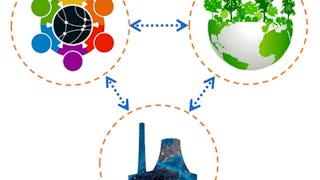Filter by
SubjectRequired
LanguageRequired
The language used throughout the course, in both instruction and assessments.
Learning ProductRequired
LevelRequired
DurationRequired
SkillsRequired
SubtitlesRequired
EducatorRequired
Explore the Environmental Chemistry Course Catalog

Skills you'll gain: Anomaly Detection, Computer Vision, Microsoft Azure, Data Ethics, Artificial Intelligence, Natural Language Processing, Artificial Intelligence and Machine Learning (AI/ML), Azure Active Directory, Machine Learning, Generative AI, Predictive Modeling, Information Privacy

University of Colorado Boulder
Skills you'll gain: Environmental Policy, Environment, Environmental Issue, International Relations, Policy Analysis, Energy and Utilities, Policy Development, World History, Mitigation, Economics, Environmental Science, Data Analysis, Physical Science, Forecasting, Emerging Technologies
 Status: Free
Status: FreeESSEC Business School
Skills you'll gain: Collaboration, Business Transformation, Social Justice, Environmental Issue, Political Sciences, Social Sciences, Systems Thinking, Economics, Policy, and Social Studies, Sociology, Community Development, Cultural Diversity, Lifelong Learning, Governance
 Status: New
Status: NewUniversity of Illinois Urbana-Champaign
Skills you'll gain: Environmental Social And Corporate Governance (ESG), Food and Beverage, Consumer Behaviour, Environmental Issue, Environment and Resource Management, Corporate Sustainability, Economics, Packaging and Labeling, Public Policies, Emerging Technologies, Policy Analysis, Business Technologies, Technology Strategies

University of Colorado Boulder
Skills you'll gain: Crisis Management, Threat Management, Threat Detection, Infrastructure Security, Disaster Recovery, Emergency Response, Business Ethics, Risk Management, Engineering Management, Organizational Change, Systems Thinking, Safety and Security, Risk Analysis, Complex Problem Solving, Decision Making, Leadership
 Status: Free
Status: FreeCoursera Instructor Network
Skills you'll gain: Electrical Systems, Electric Power Systems, Electrical Power, Environmental Regulations, Power Electronics, Energy and Utilities, High Voltage, Design Specifications, Electrical Safety, Scalability, Wireless Networks, Capacity Management, Emerging Technologies, Real Time Data, Cybersecurity

LearnQuest
Skills you'll gain: Blockchain, Interoperability, Network Architecture, Systems Architecture, Solution Architecture, Software Architecture, Infrastructure Architecture, Enterprise Architecture, Cryptography, Identity and Access Management, Emerging Technologies, Encryption, Systems Integration, Solution Design, Technology Strategies, Scalability, Threat Management, Security Testing, Requirements Analysis, Prototyping

L&T EduTech
Skills you'll gain: Construction Engineering, Civil Engineering, Architecture and Construction, Construction, Construction Management, Building Design, Facility Management, Energy and Utilities, Electrical Systems, Estimation

Universidad Nacional Autónoma de México
Skills you'll gain: Strategic Partnership, Communication Planning, Project Design, Social Media, Human Centered Design, Project Planning, Community Development, Environmental Issue, Innovation, Sustainability Reporting, Project Management, Entrepreneurship, Fundraising, Presentations

Rutgers the State University of New Jersey
Skills you'll gain: Environmental Social And Corporate Governance (ESG), Purchasing, Procurement, Consolidation, Strategic Sourcing, Supply Management, Supplier Management, Corporate Sustainability, Knowledge Transfer, Diversity Programs, Performance Measurement

Fundação Instituto de Administração
Skills you'll gain: Diversity and Inclusion, Internet Of Things, Emerging Technologies, Environmental Social And Corporate Governance (ESG), Payment Systems, Corporate Sustainability, FinTech, Business Technologies, International Relations, Blockchain, Business Strategies, Digital Transformation, International Finance, Digital Assets, Global Marketing, Performance Measurement, Technology Strategies, Supply Chain, Investments

L&T EduTech
Skills you'll gain: Construction, Construction Engineering, Construction Management, Construction Estimating, Structural Engineering, Civil and Architectural Engineering, Construction Inspection, Engineering Practices, Architectural Drawing, Failure Analysis, Cost Estimation, Safety Training, Fall Protection, Safety Assurance
Environmental Chemistry learners also search
In summary, here are 10 of our most popular environmental chemistry courses
- Intro to Artificial Intelligence on Microsoft Azure: Microsoft
- Global Climate Change Policies and Analysis : University of Colorado Boulder
- Paths to a Sustainable Future: ESSEC Business School
- Modern Issues in Food & Agriculture: University of Illinois Urbana-Champaign
- Resilience & Leadership: Concepts, Definitions, & Frameworks: University of Colorado Boulder
- Creating EV Charging Hubs: Innovative Design: Coursera Instructor Network
- Advanced Blockchain Architectures: LearnQuest
- Airport Infrastructure: L&T EduTech
- Innovación y medios digitales en proyectos sociales: Universidad Nacional Autónoma de México
- Special Topics and Specialization Wrap-up: Rutgers the State University of New Jersey










